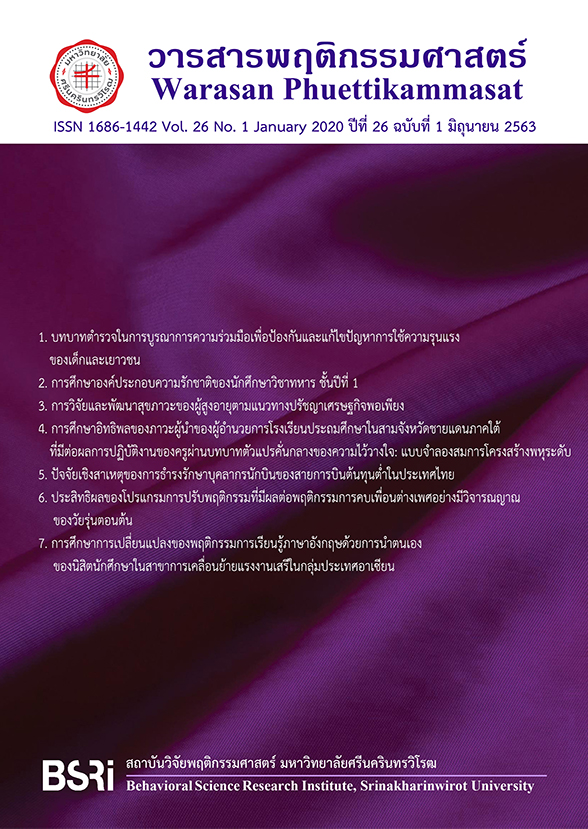Research and Development of the Elderly Well-Being Based on Sufficiency Economy Philosophy
คำสำคัญ:
ปรัชญาเศรษฐกิจพอเพียง, การพัฒนา, การทดลอง, สุขภาวะบทคัดย่อ
The purpose of this study was to examine the effectiveness of a well-being development model based on sufficiency economy philosophy of the elderly. The well-being development model was based on an integration of 3 characteristics from sufficiency economy philosophy namely reasonableness, moderation, and psychological immunity. The study was a quasi-experimental design, including pre-test and post-test with a control group. The sample was recruited from senior clubs in Bangkok, Thailand. Participants were divided into 2 groups. The intervention group (20 participants) participated in the well-being development model intervention activities, and the control group (20 participants) did not receive any intervention. The well-development model intervention consisted of 11 activity sessions for 3 days which lasted for 60-120 minutes per session. Participants from both groups completed the questionnaire at the beginning, at the end of the intervention, and at the 4 weeks follow-up assessment. The results showed that participants in the self-development intervention group scored significantly higher on psychological well-being (F(1, 37) = 12.01, p < .01, partial eta-squared = .25) and living based on sufficiency economy philosophy (F(1, 37) = 8.51, p < .01, partial eta-squared = .19) than did the control group. More specifically, participants receiving the well-being development intervention showed significantly greater psychological well-being in the domains of positive emotion and self-reliance than did the control group. The results indicated the effectiveness of the well-being development model. The findings suggest that the well-being development model based on sufficiency economy philosophy was beneficial for the elderly and senior clubs to improve psychological well-being and living based on sufficiency economy philosophy.
Downloads
เอกสารอ้างอิง
Englewood Cliffs, NJ: Prentice-Hall.
Bandura, A. (1997). Self-efficacy: The exercise of control. NY: W.H. Freeman
Barua, P & TejativaddhanaI, P. (2019). Impact of application of sufficiency economy philosophy
on the well‐being of Thai population: A systematic review and meta‐analysis of relevant
studies. Journal of Population & Social Studies. 27(3), 195-219.
Bhanthumnavin, D. (2017). Sī thotsawat khō̜ng kān khapkhlư̄an lak pratyā khō̜ng sētthakit
phō̜phīang nai sākhā čhit phrưttikam {Four decades of mobilizing the philosophy of
sufficiency economy in psycho-behavioral science}. Journal of Social Development, 19(2),
1-21.
Choochom, O., Sucaromana, A., Intasuwan, P., & Jinnge, P. (2010). Research and development of
intellectual consciousness for Thai youths’ quality of life. Procedia Social and
Behavioral Sciences, 5, 211-215.
Choochom, O. (2014). Antecedents and consequences of psychological immunity. Humanities
and Social Sciences Review, 3(3), 191-197.
Choochom, O. (2015). A causal relationship model of living behavior based on sufficiency
economy philosophy for university students. Procedia Social and Behavioral Sciences,
177, 260- 264.
Choochom, O., Sucaromana, U., Chavanovanich, J., & Tellegen, P. (2019). A model of self-
development for enhancing psychologicalimmunity of the elderly. The Journal of Behavioral Science, 14(1). 84-96.
Collins, J. (2004). Education techniques for lifelong learning: principles of adult learning.
Radiographics, 24(5), 1483-9.
Fitzgeral, S., & Schutte, N. S. (2010). Increasing transformational leadership through enhancing
self-efficacy. Journal of Management Development, 29(5), 495-505.
Foundation of Thai Gerontology Research and Development Institute. (2016). Sathānakān phū s ūngʻāyu Thai Phō̜.Sō̜. sō̜ngphanhārō̜ihāsipkāo [Situation of the Thai elderly 2016].
Bangkok: Foundation of Thai Gerontology Research and Development Institute.
Goleman, D. (1998). Working with emotional intelligence. New York: Bantam Books.
Intasuwan, P. et al. (2005). Kānwičhai læ phatthanā phrưttikam kān bō̜riphōk dūai panyā khō̜ng
yaowachon [Research and development of youth appropriate consumption behavior].
Bangkok: Behavioral Science Research Institute, Srinakharinwirot University.
National Elderly Committee. (2009). The 2nd National Elderly Plan (2002-2021). Bangkok: Ministry
of Social Development and Human Security.
National Statistical Office (2016). Sukkhaphāp čhit ( khwām suk ) Khon Thai Phō̜.Sō̜. ō̜ngphanhārō̜ihāsippǣt
[Mental Health Survey 2015]. Bangkok: National Statistical Office, Ministry of Information
and Communication Technology,
Nuchniyom, C. (2018). Kānphatthanā khunnaphāp chīwit khō̜ng phū sūngʻāyu dūai withī
phutthabūranākān [The development of life for the elderly by Buddhist integration].
Journal of MCU Peace Studies, 6(2), 624.
Office of National Economic and Social Development Board. (2017). The twelfth economic and
social development plan (2017-2021). Bangkok: Office of National Economic and Social
Development Board.
Olson, E. A., & McAuley, E. (2015). Impact of a brief intervention on self-regulation, self-efficacy
and physical activity in older adults with type 2 diabetes. Journal of Behavioral Medicine, 38(6), 886-898.
Phra Brahmagunabhorn (P. A. Payutto). (2017). Withī khit tām lak phut tham [Buddhist thinking
method]. Bangkok: Siam Printing..
Seligman, M.E.P. (1998). Learned optimism. New York: Silmon & Schusier.
Sufficiency Economy Movement Sub-Committee (2007). Sufficiency economy and implications.
Bangkok: Office of National Economic and Social Development Board.
Yaemyuen, A. (2017 Patčhai chœ̄ng hēt bǣp būranākān thāng čhit phō̜phīang čhit laksana læ
sathānakān thī kīeokhō̜ng kap phrưttikam kāndamnœ̄n chīwit tām lak pratyā sētthakit
phō̜phīang khō̜ng yaowachon nai chumchon : wikhro̜ mōdēn samakān khrōngsāng
{Sufficient mind, psychological characteristics, and situations predicting sufficiency
economy behavior of youths: An analysis of structural equation modeling]. Journal of
Social Development, 19(1), 23-37.
ดาวน์โหลด
เผยแพร่แล้ว
รูปแบบการอ้างอิง
ฉบับ
ประเภทบทความ
สัญญาอนุญาต
สถาบันวิจัยพฤติกรรมศาสตร์ มหาวิทยาลัยศรีนครินทรวิโรฒ
114 ซอยสุขุมวิท 23 ถนนสุขุมวิท แขวงคลองเตยเหนือ เขตวัฒนา กรุงเทพฯ 10110
โทร 02-649-5000 ต่อ 17600



